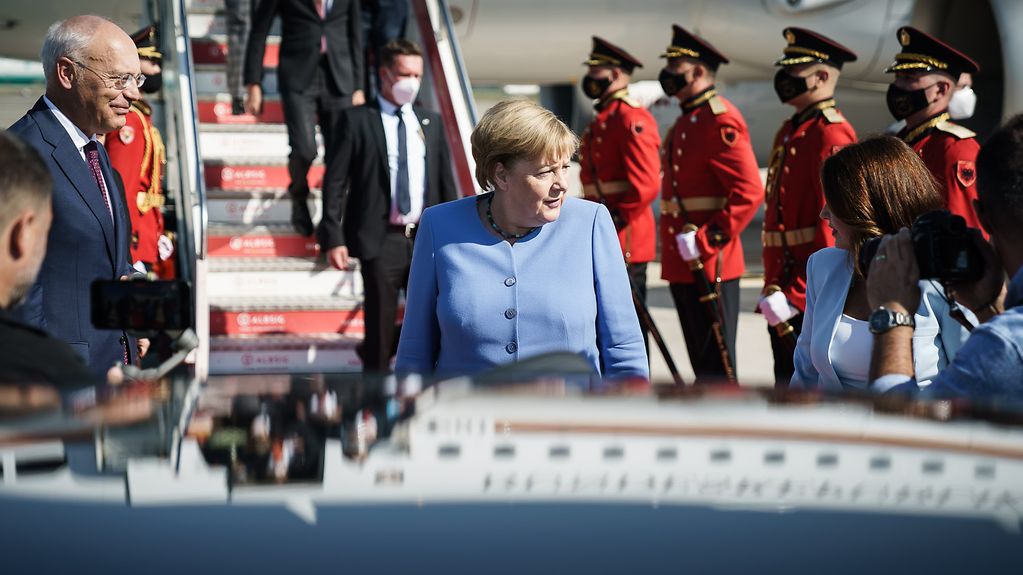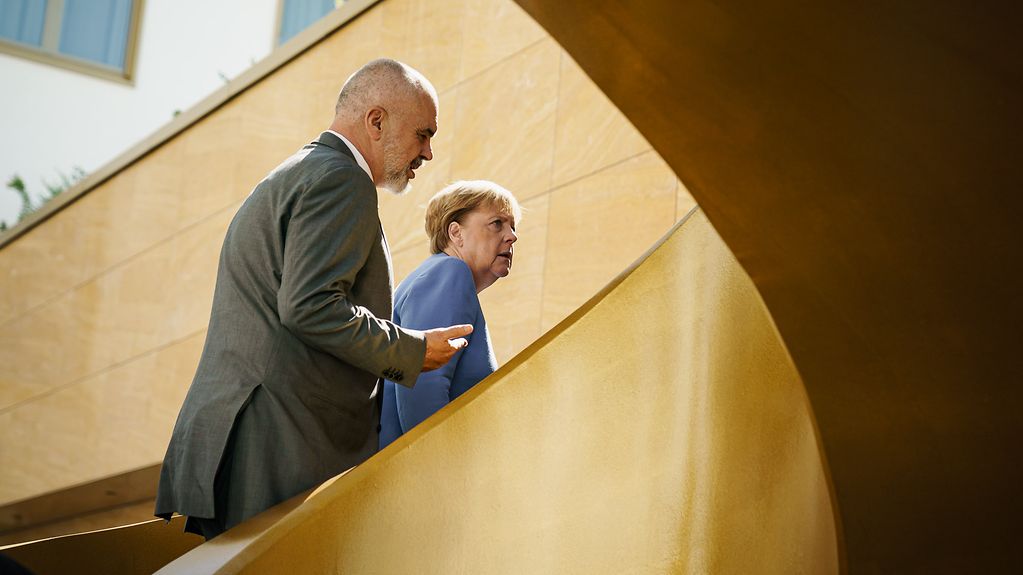Federal Chancellor visits Serbia and Albania
Federal Chancellor Merkel travelled to the Western Balkans for a two-day visit. She started by meeting President Vučić in Serbia. Then the Federal Chancellor flew on to Tirana, where she met the heads of the governments of Albania, Kosovo, Bosnia and Herzegovina, Montenegro and Northern Macedonia. She emphasised the importance of a rapprochement between these countries and the EU.
3 min reading time

On Tuesday, Federal Chancellor Merkel arrived in Tirana (Albania): discussions focused on regional cooperation and rapprochement with the EU.
Photo: Federal Government/Denzel
Federal Chancellor Angela Merkel travelled to the Western Balkans for two days. Prosperity, jobs, stability and peace for the countries of the Western Balkans – these things are worth working for. The Federal Chancellor emphasised this at a press conference with Albanian Prime Minister Edi Rama following discussions with the heads of government of all six states in the region.
The trip started with talks in Serbia
On Monday, the Federal Chancellor first flew to Serbia and met Serbian President Aleksandar Vučić for talks in Belgrade. These focused on bilateral and economic policy questions, as well as Serbia’s rapprochement with the European Union.
“I am pleased to see that, step by step, the Berlin Process is bringing progress. We have achieved quite a lot here”, said the Federal Chancellor after the talks. The Berlin Process, which was started in 2014, was “not a substitute for the EU accession process”, she said, but rather a way of getting the countries of the Western Balkans together at the regional level. This, in turn, would of course help with the accession processes in Brussels, said Merkel, even if the whole region still had a long way to go.
In Belgrade, the Federal Chancellor also met representatives of civil society from all six Western Balkan states for an exchange of ideas, pointing out that her trip was, of course, also connected with the region as a whole.
Travelling on to Albania
On Tuesday, Federal Chancellor Merkel travelled on to the Albanian capital of Tirana, where she initially met Albanian Prime Minister Edi Rama. Here, too, the focus was on bilateral, economic policy questions and questions about rapprochement with the EU. As part of the Berlin Process, the talks were followed by lunch with the heads of government of all six Western Balkan states.
The Federal Chancellor expressed satisfaction at the constructive discussion among all six participants, saying that “regional cooperation was getting going”. “People talk to each other and meet up quite normally”, Merkel said. “That was not possible before.” She added that the first transnational infrastructure projects were beginning to bear fruit. Merkel also expressly welcomed the project of the regional common market.
However, she also recalled that the EU and Germany had “an absolute interest in the integration of the countries of the Western Balkans into the European Union from a geostrategic perspective.”
Before travelling back to Berlin, the Federal Chancellor also conducted bilateral discussions with the heads of government of Kosovo, Bosnia and Herzegovina, Montenegro and Northern Macedonia.

Federal Chancellor Merkel with Albanian Prime Minister Edi Rama: discussions focused on regional cooperation and rapprochement with the EU.
Photo: Federal Government/Denzel
What is the Berlin Process?
The Berlin Process is a conference format initiated by Federal Chancellor Merkel in 2014 at the first Western Balkan Conference in Berlin; it is closely monitored by the EU Commission. Since then, participating countries have included the six Western Balkan states (“WEB6”) Albania, Bosnia and Herzegovina, Kosovo, Montenegro, Northern Macedonia and Serbia. They all have a prospect of EU membership.
Who are the Western Balkan states?
At the EU summit in Vienna in 1998, it was introduced into EU terminology to refer to those states in the Balkan peninsula which are not yet members of the EU. For this reason, alongside Albania, the Yugoslav successor states Bosnia and Herzegovina, Kosovo, Northern Macedonia, Montenegro and Serbia are counted as Western Balkan states, but not Slovenia and Croatia, which joined the EU in 2004 and 2013 respectively.